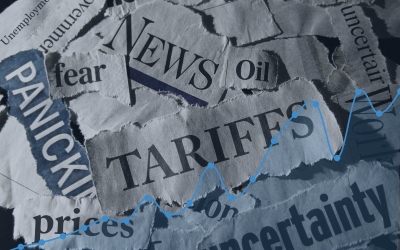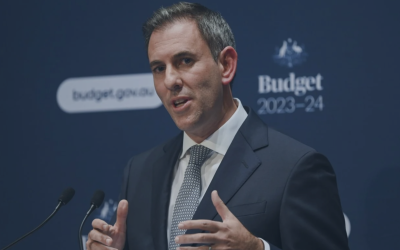Stock News & Insights
Sign up for our newsletter
Stay Informed with TAMIM Market and Stock Insights
At TAMIM, we’re dedicated to empowering investors with knowledge to effectively manage their retirement futures. Our Market and Stock Insights cover various segments to keep you updated on the latest trends, strategies, and news affecting your investments. Explore our wealth of insights across different categories to stay ahead in the evolving landscape of investments.
Subscribe to our Weekly Stock Insights

Financial markets rarely move in straight lines, but the past six years have been turbulent enough to make even seasoned investors question their intuition. We have lived through political upheaval, a global health crisis, dramatic swings in inflation, the sharpest... A year end conversation with Ron Shamgar and Robert Swift, moderated by Darren Katz As 2025 draws to a close, I decided to approach our final newsletter with a different idea. Instead of another macro roundup or performance commentary, I invited our two investment... Every December, as markets thin out and inboxes quieten, I perform a ritual that has become one of the most important parts of my investing year. I build my Christmas reading list. Not a list of holiday-fluff beach reads, and certainly not regurgitated investing... Written by Robert Swift Investors adore narratives that offer emotional comfort. “AI will save us”, “recession is cancelled”, “central banks have everything under control”, and other fairytales that make market commentators feel clever. The inconvenient truth is that... There are moments in markets when noise becomes deafening and investors search for a signal that cuts through it. Warren Buffett’s final shareholder letter does exactly that. It is part memoir, part reflection, and part masterclass in how to think about investing over... Edu Holdings, Credit Clear, and Austco Healthcare are three disciplined operators gaining momentum across education, collections technology, and healthcare systems. With improving earnings quality, attractive valuations, and multi-year structural tailwinds, these companies represent some of the most compelling quiet achievers on the ASX. If you strip investing down to its bare, unfriendly bones, you end up with a simple reality: over long periods, your returns converge toward the quality of the people running your money and the businesses you own. Balance sheets matter, valuations matter, industry... The Physical Foundations of a Digital Future Every new industrial revolution begins with a dream, but it survives only through its infrastructure. Beneath the glossy surface of AI models, electric vehicles, and connected cities lies a far less visible network of... Every first Tuesday in November, Australia stops. Offices pause, phones go silent, and productivity mysteriously dips around 3pm. The Melbourne Cup isn’t just a horse race, it’s a cultural ritual, a national pause button, and occasionally, a mirror reflecting how...
Are We in a Bubble, or Are We Just Forgetting How Markets Work?
Twelve Lessons From a Turbulent Year
Why Deep Reading Still Matters — and the Books I’m Taking Away This Year
Global Cycles Turning: Why Three Unfashionable Giants Are Quietly Repricing the World
Lessons From Omaha: Why Character Outperforms Strategy in Long Term Investing
Three Quiet Achievers: Why EDU, CCR and AHC Deserve a Place on Every Small Cap Watchlist
Finding the Leaders Who Compound For You
Wired for Water: The Hidden Champions Powering the Next Industrial Revolution
Racing Lines and Investment Lessons: What the Melbourne Cup Teaches Us About Long-Term Winners
Financial markets rarely move in straight lines, but the past six years have been turbulent enough to make even seasoned investors question their intuition. We have lived through political upheaval, a global health crisis, dramatic swings in inflation, the sharpest... A year end conversation with Ron Shamgar and Robert Swift, moderated by Darren Katz As 2025 draws to a close, I decided to approach our final newsletter with a different idea. Instead of another macro roundup or performance commentary, I invited our two investment... Every December, as markets thin out and inboxes quieten, I perform a ritual that has become one of the most important parts of my investing year. I build my Christmas reading list. Not a list of holiday-fluff beach reads, and certainly not regurgitated investing... Written by Robert Swift Investors adore narratives that offer emotional comfort. “AI will save us”, “recession is cancelled”, “central banks have everything under control”, and other fairytales that make market commentators feel clever. The inconvenient truth is that... There are moments in markets when noise becomes deafening and investors search for a signal that cuts through it. Warren Buffett’s final shareholder letter does exactly that. It is part memoir, part reflection, and part masterclass in how to think about investing over... Edu Holdings, Credit Clear, and Austco Healthcare are three disciplined operators gaining momentum across education, collections technology, and healthcare systems. With improving earnings quality, attractive valuations, and multi-year structural tailwinds, these companies represent some of the most compelling quiet achievers on the ASX. If you strip investing down to its bare, unfriendly bones, you end up with a simple reality: over long periods, your returns converge toward the quality of the people running your money and the businesses you own. Balance sheets matter, valuations matter, industry... The Physical Foundations of a Digital Future Every new industrial revolution begins with a dream, but it survives only through its infrastructure. Beneath the glossy surface of AI models, electric vehicles, and connected cities lies a far less visible network of... Every first Tuesday in November, Australia stops. Offices pause, phones go silent, and productivity mysteriously dips around 3pm. The Melbourne Cup isn’t just a horse race, it’s a cultural ritual, a national pause button, and occasionally, a mirror reflecting how...
Are We in a Bubble, or Are We Just Forgetting How Markets Work?
Twelve Lessons From a Turbulent Year
Why Deep Reading Still Matters — and the Books I’m Taking Away This Year
Global Cycles Turning: Why Three Unfashionable Giants Are Quietly Repricing the World
Lessons From Omaha: Why Character Outperforms Strategy in Long Term Investing
Three Quiet Achievers: Why EDU, CCR and AHC Deserve a Place on Every Small Cap Watchlist
Finding the Leaders Who Compound For You
Wired for Water: The Hidden Champions Powering the Next Industrial Revolution
Racing Lines and Investment Lessons: What the Melbourne Cup Teaches Us About Long-Term Winners
Financial markets rarely move in straight lines, but the past six years have been turbulent enough to make even seasoned investors question their intuition. We have lived through political upheaval, a global health crisis, dramatic swings in inflation, the sharpest... A year end conversation with Ron Shamgar and Robert Swift, moderated by Darren Katz As 2025 draws to a close, I decided to approach our final newsletter with a different idea. Instead of another macro roundup or performance commentary, I invited our two investment... Every December, as markets thin out and inboxes quieten, I perform a ritual that has become one of the most important parts of my investing year. I build my Christmas reading list. Not a list of holiday-fluff beach reads, and certainly not regurgitated investing... There are moments in markets when noise becomes deafening and investors search for a signal that cuts through it. Warren Buffett’s final shareholder letter does exactly that. It is part memoir, part reflection, and part masterclass in how to think about investing over... If you strip investing down to its bare, unfriendly bones, you end up with a simple reality: over long periods, your returns converge toward the quality of the people running your money and the businesses you own. Balance sheets matter, valuations matter, industry... The Physical Foundations of a Digital Future Every new industrial revolution begins with a dream, but it survives only through its infrastructure. Beneath the glossy surface of AI models, electric vehicles, and connected cities lies a far less visible network of... Every first Tuesday in November, Australia stops. Offices pause, phones go silent, and productivity mysteriously dips around 3pm. The Melbourne Cup isn’t just a horse race, it’s a cultural ritual, a national pause button, and occasionally, a mirror reflecting how... Most investors like to think they’re making decisions based on hard numbers. They pore over charts, debate valuations, and argue about whether the economy is heading for a soft or hard landing. But the truth is, the most important determinant of long-term investment... After nearly two years of debate, the government has unveiled a revised version of the superannuation tax reform, softening some of its most controversial elements. The good news for trustees: unrealised gains will no longer be taxed. The bad news: the measure still...
Are We in a Bubble, or Are We Just Forgetting How Markets Work?
Twelve Lessons From a Turbulent Year
Why Deep Reading Still Matters — and the Books I’m Taking Away This Year
Lessons From Omaha: Why Character Outperforms Strategy in Long Term Investing
Finding the Leaders Who Compound For You
Wired for Water: The Hidden Champions Powering the Next Industrial Revolution
Racing Lines and Investment Lessons: What the Melbourne Cup Teaches Us About Long-Term Winners
Risk Is a Choice: Why Your Willingness to Take Risk Matters More Than You Think
Super Tax 2.0: What the New Changes Mean for SMSF Trustees
When the Foundations Shift, Opportunity Emerges The global economy is standing on a precarious sandpile, one built from years of excess leverage, underpriced risk, and political complacency. With each new grain, be it a policy misstep, a rate shock, or a geopolitical... A new and insidious form of recession is brewing, not one born from financial system failure or natural market cycles, but from policy-driven paralysis. At its heart lies an erratic trade strategy, where punitive tariffs are wielded as a bargaining chip in... The past week has seen global markets whipsaw amid the latest U.S. tariff announcements, with Australian equities caught in the crosscurrents. Initially, global equities shed over $5.4 trillion in value following sweeping U.S. tariffs on imports, sending the S&P... The February reporting season presented one of the most dynamic market environments in recent memory. Earnings results triggered sharp movements, with investors swiftly adjusting their positions based on performance. This created significant shifts in valuations, with... In the wake of the recent U.S. election and Donald Trump's return to the White House, global market sentiment remains cautiously optimistic; however, there is widespread speculation regarding the potential impacts on international trade and diplomacy. While many... Introduction: A Timely Reminder from Howard Marks As Treasurer Jim Chalmers seeks to modernise the Reserve Bank of Australia (RBA) with one of the most substantial reforms in decades, Howard Marks’ latest memo serves as a reminder of the dangers of interventionist... As investors, staying informed about economic indicators is crucial to making sound investment decisions. The Consumer Price Index (CPI) is one such indicator, providing insights into the inflationary trends within the economy. Today, the Australian Bureau of... On 22 February 2024, Japan’s Nikkei 225 closed at ¥39,098.68, eclipsing the previous record high set in December 1989–a staggering 34 years ago. As we highlighted in a prior article, Japan went through a truly extraordinary boom in asset prices through the 1980s that... It’s a common investing belief that higher interest rates are a negative for stocks. As the world’s most famous investor Warren Buffett creatively described at the Berkshire Hathaway (NYSE: BRK.B) 2013 annual general meeting, “Interest rates are to asset prices, you...
Embracing the Chaos: Volatility, Sandpiles, and the Bold Path Forward
The Uncertainty Recession: When Policy Paralysis Threatens Real Growth
Tariffs and the ASX: What the U.S. Backflip Means for Investors
Capitalising on Market Cycles: Lessons from February’s Volatility
Could China’s Path to Stability be an Investor’s Opportunity?
Chalmers’ RBA Dilemma: Striking a Balance Between Reform and Free Market Principles
Understanding the Latest CPI Data: Is Inflation Moderating?
All Time Highs: Japan’s Revival
Insurance: A Rare Winner from Higher Interest Rates?
Investing in ASX Sectors
About TAMIM Asset Management
TAMIM Asset Management is a boutique investment firm that provides a variety of investment solutions tailored to our clients’ needs, with a commitment to safeguarding their wealth. At TAMIM we delivering expert solutions across equities, property & credit
Stay Informed with TAMIM Stock Insights
TAMIM Asset Management provides market and stock insights for general information to help you understand our investment approach. Any financial information we provide is not advice, has not considered your personal situation, and may not be suitable for you.





















